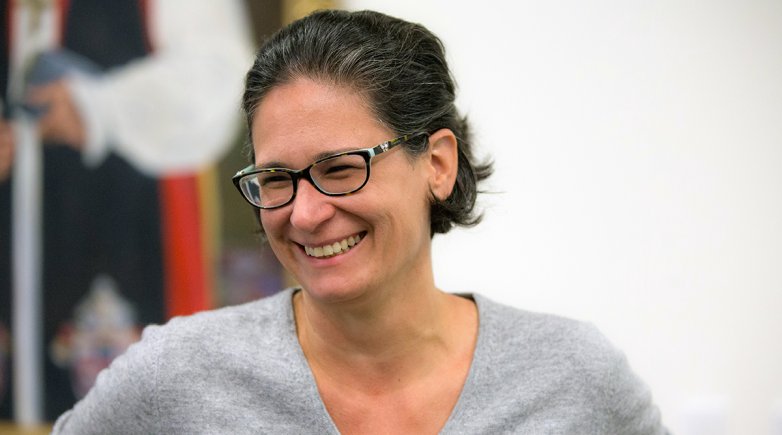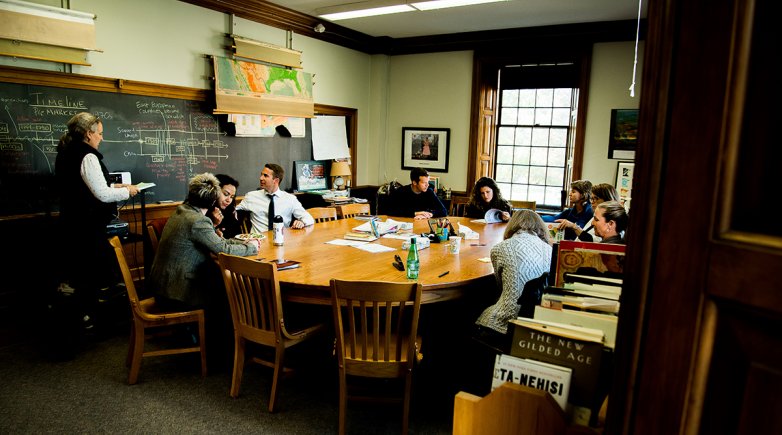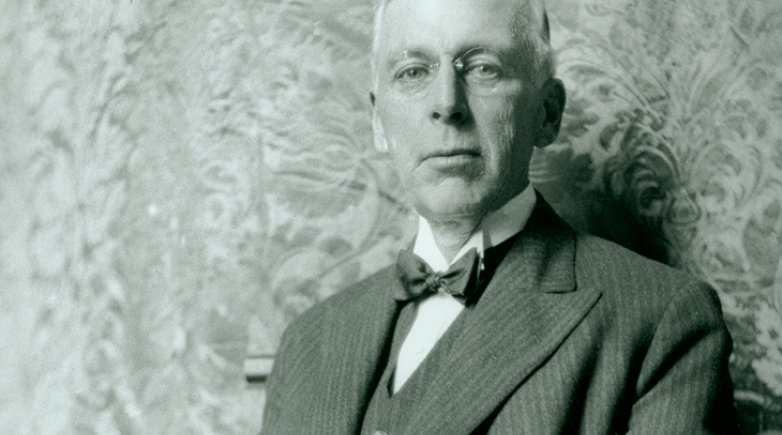Exeter Humanities Institute catches some California rays
For a West Coast pilot of the popular EHI teachers conference, PEA partners with The Bishop’s School in La Jolla, where Aimeclaire Roche ’87 is busy expanding the Harkness footprint.
"Harkness is about everyone who gathers at the table having equal capacity to contribute," says Roche.
Exeter Humanities Institute, the secondary school teachers workshop that explores Harkness learning, will experience a first this month: the sunny climes of La Jolla, California.
Six experienced PEA faculty, including a workshop leader from EHI’s debut in 2000, will spend a week with 84 teachers. Split into small groups around Harkness tables, workshop participants learn how to adapt models of discussion-based, student-centered teaching for their needs.
For years, interest in EHI has exceeded available spots by several hundred. The La Jolla pilot brings the conference closer to home in an area of historic high demand: California and the West.
EHI’s home away from home could not be more fitting. Bishop’s is a grades 6-12 school that has integrated Harkness principles into many classrooms and continues to expand exposure at all grade levels. Exeter alumna Aimeclaire Roche ‘87, who became head of school at Bishop’s eight years ago, has taught at Exeter and now leads Bishop’s in implementing a teaching approach based on giving primacy to the learner’s point of view.
Here are excerpts from a conversation we held with Roche a few days before the start of the conference.
Q: Why is Bishop’s using Harkness methods?
When I first came here and had conversations with colleagues, students and parents, everyone was always so proud when the students themselves took ownership of their learning and were actively making meaning. It occurred to me that we’re all at our best when we look at things through the lens of what the experience is like for the learner, versus the teacher.
We look at everything we do from the learner’s point of view. When youngsters don’t get something, when they struggle, some teachers are prone to say, “But we learned this on Tuesday, see it’s right here on the syllabus.” Let’s get over when we taught something! It actually doesn’t make any difference until the learning happens.
Q: What has been your role in bringing Harkness to Bishop’s?
Over the past eight years we’ve been playing with a common language as a way of bringing unity. Not homogenizing, but bringing a sense of cohesion to what we do in the classroom.
Which leaves lots of room for lots of idiosyncratic ways of teaching. Nobody wants to have every class be exactly the same. That would take the magic out of how much fun it is to be a teacher. Or a student. But the idea of placing a common priority on the learner’s experience is something that we’ve really worked hard on over the last six to eight years.
I brought the lens of my own Exeter experience. I also brought the common language of a student-centered approach to what we do.
Q: What do Bishop’s students say about Harkness?
When they think about classes that have been really engaging, broadening experiences for them, and have made them more active with that content, they talk about classes that tend to follow the Harkness pedagogy – where you have a small number of young people working together on something.
They know that they have the power to affect the discussion. They talk about how invigorating that is.
Q: After attending Exeter as a student and then teaching at another school, you returned to PEA to teach as a one-year sabbatical replacement in the Classical Languages Department. What was that experience like?
Teaching at Exeter was my first experience as an educator at the table. It began to become clear to me in a new way the impact of having a small class. And having the physical layout where you look each other eye to eye. You have an entirely different experience both with the material as well with one another.
It was a pivotal moment for me because it put me into a setting that I knew as a student was really healthy and expansive but now I could really appreciate as the adult in the room.
What I say to our constituents here at Bishop’s – when I talk about student-centered learning and Harkness being integral to that – is that it’s about a power dynamic. The beauty of Harkness is that it compresses that hierarchy because you take a seat at the table with your students. You can begin to dispel some of the assumptions around authority and power and hierarchy that come with the position of teacher and the various pieces of social capital you bring with that.
For me Harkness is about also being a learner, with forever being a learner. I share that space and share that quest to grapple with whatever materials are in front of us with the students.
Q: Why do you want to host EHI?
We had a group of 20 or so teachers and administrators read the most recent book of essays published by Exeter – Classroom Revolution: Reflections on Harkness Learning and Teaching. This group gathered throughout the school year to use the essays as a launching pad to talk about our work and about how Harkness really takes root in a school community. That created a lot of energy around wanting to see if we could partner with the Academy on EHI.
What has been so invigorating is the connection between and among great schools. The 84 people who will join us here in July are educators from all different kinds of schools. Our work is not siloed. It’s not private. It has a sense of shared colleagueship.
We all are part of a wider landscape and wider dialogue about what’s good for learners.



